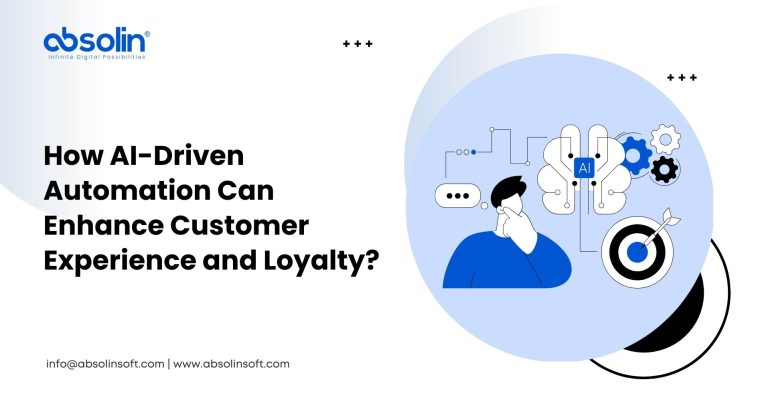How AI-Driven Automation Can Enhance Customer Experience and Loyalty?
In the age of technology, customer expectations are higher than ever. They demand seamless, personalized, and immediate experiences when interacting with businesses, which makes it crucial for companies to leverage AI-driven automation to stay ahead of the competition. Artificial Intelligence (AI) has revolutionized various aspects of business, but its impact on customer experience (CX) and loyalty is particularly profound. By integrating AI-driven automation into customer service processes, businesses can offer enhanced experiences that not only satisfy customers but also build long-term loyalty.
Understanding AI-Driven Automation in Customer Experience
AI-driven automation refers to the use of artificial intelligence technologies such as machine learning, natural language processing (NLP), and predictive analytics to automate tasks, processes, and interactions with customers. This technology can analyze vast amounts of data, predict customer behavior, and make decisions that would typically require human intervention. When applied to customer service, AI automation can create highly efficient, personalized, and scalable solutions.
Some common AI-driven automation tools include:
- Chatbots: These are automated tools that use NLP to engage in real-time conversations with customers.
- Robotic Process Automation (RPA): RPA is used to automate repetitive tasks like data entry or processing customer orders, which allows employees to focus on higher-value work.
- Predictive Analytics: AI can analyze historical customer data to forecast future behaviors, helping businesses anticipate customer needs and preferences.
- Personalization Engines: These AI tools use data to provide tailored recommendations, offers, or experiences to each customer.
Enhancing Customer Experience with AI-Driven Automation
AI-driven automation elevates the customer experience by ensuring that businesses can deliver personalized, efficient, and consistent service across multiple touchpoints. Here’s how:
1. 24/7 Availability
Gone are the days when customers had to wait for business hours to resolve their issues. AI-powered chatbots and virtual assistants are available around the clock, providing immediate responses to customer queries, handling complaints, and solving problems without delays. This constant availability ensures that customers feel valued and appreciated at all times, no matter their location or time zone.
2. Personalized Interactions
AI enables businesses to personalize customer interactions by analyzing past behavior, preferences, and purchase history. For instance, AI algorithms can recommend products or services based on a customer’s previous interactions with the brand. This level of personalization creates a sense of individualized service, which can significantly improve customer satisfaction and increase conversion rates.
For example, an AI-powered recommendation engine in an e-commerce store can show customers products that are likely to interest them based on their browsing patterns. Personalized emails, offers, and even chat interactions can further improve engagement and brand affinity.
3. Quick Resolution of Issues
In today’s fast-paced world, customers value their time. AI-driven automation helps reduce the time it takes to resolve issues by automating common service processes and answering frequently asked questions instantly. AI can also triage more complex issues and route them to the right human agent for resolution. This ensures that customers don’t have to waste time navigating through long queues or waiting on hold for a support representative.
4. Predictive Service Delivery
AI-driven predictive analytics can anticipate customer needs and proactively address them before customers even ask. For instance, AI tools can analyze customer behavior and identify when a customer may be about to make a purchase or when a product is likely to be out of stock. With this information, businesses can send timely alerts or recommendations, providing a more proactive and satisfying experience. By anticipating customer needs, companies can improve their service offerings and enhance satisfaction.
5. Omnichannel Consistency
In a world where customers interact with brands through multiple channels — websites, mobile apps, social media, and more — providing a consistent experience is critical. AI automation ensures that customers receive the same level of service regardless of the channel they choose. Chatbots and virtual assistants can maintain context and provide seamless transitions across channels, allowing customers to switch from one platform to another without losing the continuity of their interactions.
How AI-Driven Automation Builds Customer Loyalty
Customer loyalty goes beyond simply providing good service; it’s about creating experiences that customers value and trust. AI-driven automation can play a crucial role in fostering this loyalty in several ways:
1. Faster and More Efficient Service
Customers appreciate businesses that value their time. By automating routine tasks and streamlining workflows, AI reduces wait times, improves response accuracy, and increases operational efficiency. When customers know they can rely on quick, seamless service, they’re more likely to return.
2. Consistent, High-Quality Service
AI automation ensures that businesses maintain consistent service quality. Whether a customer is interacting with a human agent or an AI-powered chatbot, the experience remains highly professional and accurate. This consistency helps build trust with customers, making them feel secure in their decision to stay loyal to the brand.
3. Data-Driven Loyalty Programs
AI can enhance loyalty programs by analyzing customer data to identify patterns and preferences. Businesses can create personalized loyalty rewards that resonate with individual customers. For example, an AI system could offer rewards based on a customer’s past purchases or suggest loyalty bonuses for items they are likely to buy in the future. The more tailored and relevant the rewards, the more likely customers are to engage and remain loyal to the brand.
4. Continuous Improvement
AI tools are designed to learn from interactions, meaning businesses can continuously improve their service offerings based on real-time customer feedback and behaviors. With AI, businesses can identify areas for improvement, test new service models, and refine their approaches to meet evolving customer needs. This ongoing commitment to improvement strengthens customer relationships and encourages brand loyalty.
5. Building Emotional Connections
While AI may be seen as a tool for automation, it can also play a vital role in building emotional connections with customers. Through advanced NLP and sentiment analysis, AI systems can detect customer emotions and adapt responses accordingly. For instance, AI-driven customer service platforms can detect frustration or dissatisfaction in a customer’s tone and escalate the issue to a human agent who can address the concern empathetically. When customers feel heard and understood, they are more likely to develop a long-term, emotional attachment to the brand.
Conclusion: The Future of AI-Driven Customer Experience
The potential of AI-driven automation to enhance customer experience and foster loyalty is immense. By delivering personalized, efficient, and consistently high-quality service, AI has the power to transform how businesses interact with their customers. In turn, this leads to deeper customer loyalty, increased retention, and ultimately, higher revenue.






